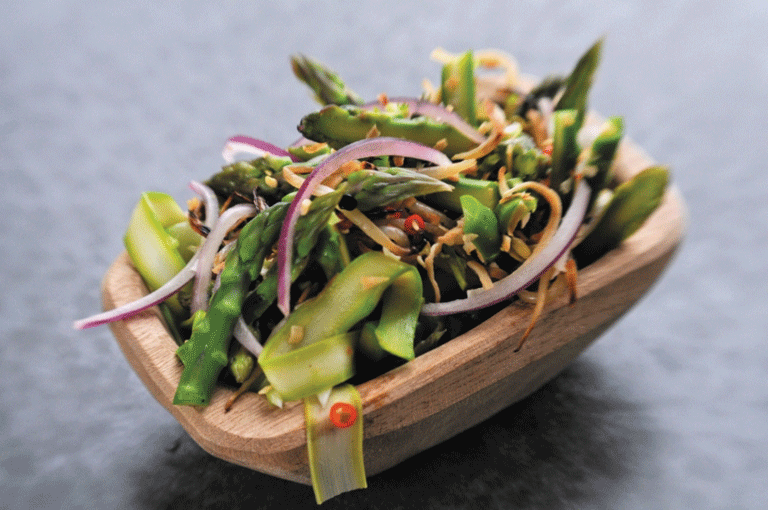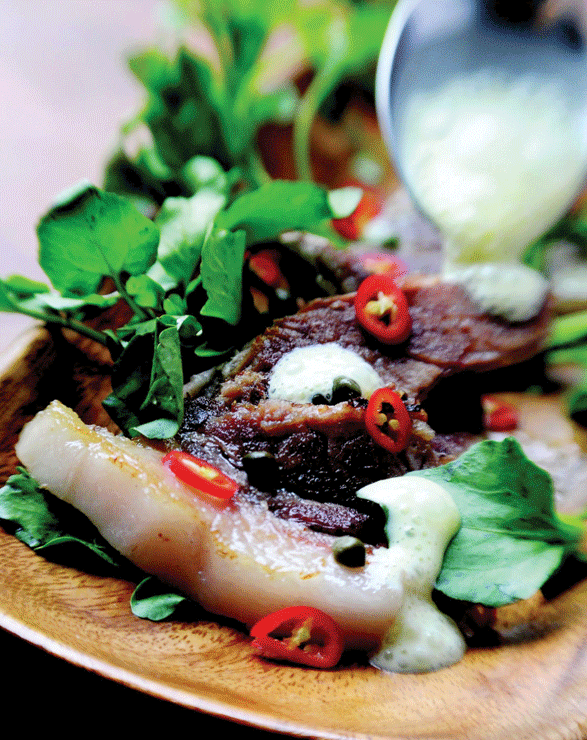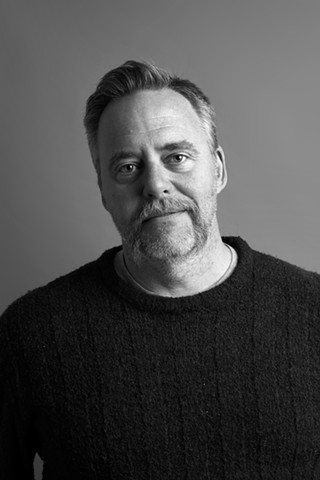An Interview with Zakary Pelaccio
How Small is Now?
[]
Zakary Pelaccio, innovative chef/owner of the Fatty Crab and Fatty Cue restaurants in New York City (there is also one in St. John), is on his way to being a celebrity chef along the lines of a Bobby Flay or Mario Batali. Or, rather, Pelaccio was, until he recently decided to dial back his involvement with his growing Fatty empire and spend more time at his weekend retreat in Chatham. In October, Pelaccio, along with his partner Jori Jayne Emde, will open an as-yet-to-be-named restaurant just off Warren Street on South 3rd Street in Hudson.
In a fit of editorial inspiration, I dispatched the equally iconoclastic chef Rich Reeve of Elephant Wine Bar in Kingston to talk with Pelaccio at his home in Chatham in late June. What follows is an edited transcript of their wide-ranging conversation.
Pelaccio is a gastronome’s gastronome. It doesn’t have to be fussy to be delicious. As he writes in the foreword to his book, “You can be a serious cook without being too serious about cooking. You want the pork belly you’re braising to be fucking tasty, but come on, you’re making dinner, not performing a triple bypass.”
Zakary Pelaccio will be reading from Eat with Your Hands at bluecashew Kitchen Pharmacy in Rhinebeck on August 4 at 2pm. (845) 876-1117; Bluecashewkitchen.com.
—Brian K. Mahoney
Rich Reeve: Where did the idea to open a restaurant in Hudson come from?
Zakary Pelaccio: I didn’t want to continue with the Fatty Crab and Fatty Cue expansion. Not because I don’t love it, I do, but I’m interested in cooking at a slower pace of life. What the expansion is calling for is flying to different cities and making deals, and doing all that sort of stuff that I started to learn is not really my interest.
Jori and I kept talking about collaborating together, talking about our different ideas for food, things we like to cook. Just things we started cooking as we hung out together [in Chatham]. And we want to flesh it out, have some fun, be creative again—raw creative as opposed to calculated creative. "Hey, we’re going to introduce a new recipe, we’re going to have 5 people sit around a table, taste this, determine if it’s right, tweak it again, taste it again, and then we’ll teach it to the five other cooks in the other restaurants." That sort of tier thing. The idea of raw creativity is, "Hey, today we’re going to do this and it’s going on the menu tonight."
RR: That’s why I opened Elephant. I didn’t want to be in charge of 10 guys anymore. I didn’t want to have to go through a general manager or tasting panels. I was like—you know what I got this at the store today? I’m going to cook it this way.
ZP: It’s always a trade-off, right? I’m going to be working harder, Jori’s going to be working harder, we’re both going to be working harder than we have in a while. I mean in the cooking sense. I’ve been working hard doing other stuff. And I realize it’s not OK, so-and-so is the chef cooking tonight, Jori and I are going to scoot out of here and go out to dinner somewhere else and get drunk and have a fun night in the city. No, I’m going to be working until the last table is fed. It’s a shift back into that life, but it’s a deliberate one. It’s one on our own terms, it’s one that we’re choosing to do. It’s exciting.
RR: Is there a style of food you’re going to do there or is it going to be more open-ended? You’re not doing Fatty Crab type food?
ZP: No. It won’t be thematic. It won’t be Southeast Asian or Asian or Italian. There will be elements of everything that’s influenced me.
RR: What makes sense to you that day. Sometimes I’m in the mood for a taco, so that’ll be on the menu.
ZP: It’s the idea, that, hey, we can cook whatever we want. I think one thing Jori and I agree on is the way we’re going to shape the menu. We want to give the whole thing some sense of balance. I don’t like my food as heavy as I used to like it. Not that I don’t like heavy food and intense flavors, but it used to hit him over the head. Now it’s sort of simplified. I’m not thinking more refined. It’s not going to be a fussy over-manicured presentation. What I took from the years in Malaysia and Thailand is thinking about the balance of the food. The sweet and the salty and the savory and the spicy and the bitter and how these balance each other. How you play with them. Why wouldn’t we continue to think in that vein?
RR: Why does it only have to apply to Asian food? Why can’t it apply to the greens you find at the Farmers' Market?
ZP: Jori made this beautiful kimchi from rhubarb. It’s so brilliant, and so tasty. And it’s not Korean. It’s not Asian. It’s adapting a local product to a type of fermentation that’s typical in a lot of different pickles. It’s global. It’s now.
A lot of people are also obsessively local. This idea informs everything that they buy. Jori made a great rhubarb kimchi, but she used fish sauce from Asia. We’re not going to be rigorously local in that sense.
RR: The question of authentic... I heard what Anthony Bourdain or David Chang think of authentic, and they’re like, “Screw it.” I’m going to cook how it makes sense to me, using those techniques or that philosophy. Did you consider Fatty Crab authentic Malaysian food?
ZP: I never considered it Malaysian food. I considered it more inspired. The initial menu was more Malaysian-inspired than any other identifiable cuisine.
RR: The Fatty Crab, I think I’ve been there a 100 times. I’ve gotta be honest with you. I remember explaining to someone it’s like an ex-GI landed in Malaysia, opened this bar and started cooking with an American sensibility
ZP: It’s not authentic. What I was able to do was confidently use those flavors because I lived and cooked there. I didn’t just pass through Malaysia. I didn’t go there on a holiday for two weeks, but I lived there and I worked there to understand those flavors and that gave me the ability to play around with them with more confidence and more understanding than maybe somebody who is just saying “I like Thai food so I’m going to cook it.” The idea is that I actually understood the flavors so they became my own.
RR: That’s when I think you really learn something. If you’re just copying a cuisine, then you’re not using your own head.
ZP: And you’re not being creative. To me, that’s the turn-on about the whole thing.
RR: Why’d you do a cookbook?
ZP: Because a buddy of mine, who ended up being my literary agent, asked me to do one.
RR: In the beginning of your book you write: “I never want to cook anything twice.” And the premise is you’re writing a cook book.
ZP: I don’t really like the idea of cooking things. It’s funny because I love to cook, but I don’t love routine. And there’s so much routine to cooking. There’s so much making stocks. I don’t mind repetition. I like cutting. I love precision cutting and butchering. I guess the idea is, if I had to go into a restaurant and execute the same dishes every single day, I would go out of my mind. I need to cook new things.
RR: That’s why you like this new concept. You can say, “I’m tired of that dish, I’m done, I’m moving on.”
ZP: I tried that with Fatty a couple times and people would get upset.
RR: That was the next thing I was going to ask. There are a few iconic dishes like the Fatty Duck, the Fatty Crab, and the Pork Belly and Watermelon. I’ve seen so many chefs copy that dish, myself included. Did you ever try to take any of those off the menu? People would try to kill you.
ZP: Yeah, we literally got some death threats. It was fucking funny.
RR: One thing that made Fatty iconic, at least to me, and something I thought was really cool in the cookbook, was the idea of matching music with the food. You walk into Fatty, it is banging. You put the music in the book, obviously it’s an important issue with you.
ZP: I love music. That’s the simplest answer, but that’s the whole thing. When we started Fatty we weren’t thinking: Is this a restaurant that will be successful? Is this a restaurant that’ll work? Is this what people want? We were thinking that this is where we are now, this is what we’re cooking, this is our party. We’re happy to have everyone join. It’s our party and it’s inclusive. Come and join in and dig it, but “Excuse me can you turn the music down?” No, we can’t turn it down. Why does every restaurant have to sound look and taste the same? Our age group didn’t grow up listening to jazz. It’s like going to a dentist office when you go to a restaurant.
A lot of people try to corporatize something so it will appeal to the masses. You can’t have one restaurant that will appeal to all people. Guys have tried to do that over and over again, very successful guys, and guys that I respect who own multiple restaurants.They write these really long menus and they do it because they are running a business and see it as a business. What I’ve always felt, and it’s the way we’ve conducted things, is that people are rejecting the idea of the big menu. Big is out. Small is in.
RR: When did you know you wanted to be a chef? Was there a moment? Was it by happenstance? Was it, “I’m out of college and need to pay off some loans?"
ZP: No, it wasn’t that. I think that I just sort of kept going back to cooking while I was dealing with my general disenchantment of the world. It was just something I could do while dealing with an existential dilemma.
















